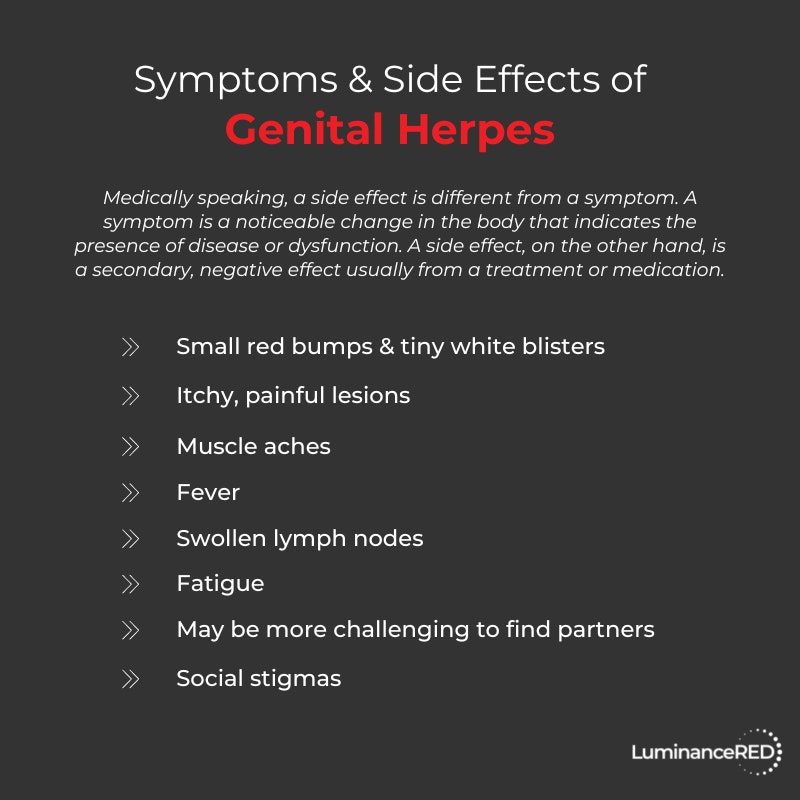What Side Effects Are Associated With Genital Herpes?

“You have genital herpes.”
No one wants to hear those words from their healthcare provider, but if you do hear them, you’re not alone. According to the Centers for Disease Control and Prevention (CDC), more than one in six Americans between ages 14 and 49 have genital herpes — and many experience genital herpes side effects.
As with any diagnosis, it’s best to have as much information about your condition as possible so you can understand how it will impact your life and what you can do to manage it.
Genital herpes can result in several symptoms, as well as some social consequences. In addition, medical and supplemental treatments for genital herpes can produce a variety of side effects.
Before we explore these side effects, let’s clarify the difference between a side effect and a symptom.

Symptoms vs. Side Effects
Medically speaking, genital herpes side effects are different from genital herpes symptoms.
A symptom is a noticeable change in the body that indicates the presence of disease. For example, a fever, cough, and headache are all flu symptoms.
A side effect, on the other hand, is a secondary, undesired negative effect of a treatment or medication. For example, chemotherapy drugs are intended to kill cancer cells; that’s their desired effect. But many chemotherapy patients lose their hair; that’s a side effect of chemotherapy.
In this article, we’ll explore genital herpes side effects and genital herpes symptoms. We’ll discuss some common (and less common) symptoms of genital herpes, social side effects of the disease, and side effects of the most common treatment options.
Herpes Sores
Before exploring genital herpes side effects and symptoms, let’s clarify what causes herpes and the difference between genital sores and cold sores.
Both genital herpes and cold sores are caused by the herpes simplex virus, or HSV. The herpes simplex virus type 1, or HSV-1, typically causes cold sores, while the herpes simplex virus type 2, or HSV-2, typically causes genital herpes. Both can be contracted from a sexual partner and cause painful blisters.
A cold sore is a blister that forms on or around your mouth. This sore is contagious and spreads through skin-to-skin contact or sexual contact. You can contract genital herpes from HSV-1 through oral sex with a person who has a cold sore on their mouth.
HSV-2 causes sores and blisters to form around the genitals or rectum. In some cases, genital herpes can cause blisters on other parts of the body, including the mouth when spread through oral sex. These blisters can be painful.
If you have any active outbreaks from either HSV-1 or HSV-2, take precautions with your sexual partner — but remember that you can spread the herpes simplex virus to others even without sexual contact.
For example, the virus can spread to babies and children through normal contact like snuggling, kissing, or feeding. In very young babies, this can lead to a dangerous condition called neonatal herpes. Neonatal herpes may stop at a cold sore; however, the symptoms can become much more serious, especially for infants under one month old.
If you suspect your baby has contracted herpes, prompt treatment is crucial. Seek medical attention right away, even if you’re unsure.

Genital Herpes Symptoms
If you’ve been exposed to genital herpes, that doesn’t mean you’ll experience symptoms right away. Sometimes, the virus lies dormant for a long period of time. In some cases, you may never experience active symptoms.
If you do develop an outbreak of genital herpes, it can range from mild to very severe, with the first outbreak usually being the worst. Let’s review some common and not-so-common symptoms.
Common Symptoms
The hallmark symptom of genital herpes is the small red bumps or tiny white blisters that appear on and around the genitals after infection. Ulcers can form when the blisters rupture, and eventually scabs form. The area affected by the herpes lesions is usually itchy and/or painful.
Outbreaks can occur on the genitals, anus, buttocks, or upper thighs. For women, lesions can also develop inside the body — in the vagina or on the cervix.
As of this writing, there is no cure for herpes. Once someone has been infected with the virus, it will always be present in their body. Symptoms come and go because the virus retreats to lie dormant in a person’s nerves between outbreaks. Then, itchy, painful lesions reappear when a trigger reactivates the virus.
For most people, outbreaks occur less often over time.
Less Common Symptoms
In some cases, flu-like symptoms accompany a genital herpes infection. These symptoms are more common during a person’s initial outbreak and can include muscle aches, fever, and swollen lymph nodes.
A general feeling of being “run down” and exhausted can accompany a first herpes outbreak. This may occur on its own, alongside the flu-like symptoms mentioned above, or with swollen lymph nodes in your groin.
Headaches plague as many as 15% of people who experience recurrent genital herpes outbreaks. In very rare cases, a headache combined with a stiff neck, fever, light sensitivity, confusion, and other symptoms indicates a more serious condition called herpes meningoencephalitis, which requires immediate medical attention.
Genital Herpes Side Effects: Social
Perhaps the most common genital herpes side effect isn’t physical at all — it’s social.
Despite being one of the most common sexually transmitted infections, herpes carries an unfortunate stigma that can affect your personal relationships, especially romantic relationships with intimate partners. Thankfully, these challenges can be navigated with a little thought and education.
The Challenge of Finding Partners
Though it can be daunting and awkward, it’s important to disclose your genital herpes diagnosis to potential sexual partners. Many people are wary because there is no cure for herpes, but having an honest conversation about the signs, symptoms, and side effects of genital herpes can bring you and your partner closer.
Discussing protective measures, such as taking antiviral medication or avoiding sexual contact during active outbreaks, can put your partner’s mind at ease. For example, one helpful study shows that if an infected person takes a prescription antiviral medication daily as a preventative, they have a less than 2% chance of spreading HSV-2 to a sexual partner.
Social Stigma
However, even if you take antiviral medication and use adequate protection during sexual encounters, there’s still a chance you could spread genital herpes to your partner. With this fact comes a lot of social stigma, which some people feel is more difficult to deal with than any other genital herpes side effects. Even a simple cold sore can come with stigma!
The social stigma of herpes can have a huge impact on mental health. If you contracted herpes from a loved one, you may have to deal with feelings of anger or resentment. You might see genital herpes as an end to your romantic life. Things that used to be fun, like first dates and first kisses, now induce anxiety and stress.
In extreme cases, thoughts like these can lead to depression and isolation. It’s rare to see genital herpes mentioned in pop culture in a way that isn’t degrading or used for a punchline. Even well-meaning friends and loved ones who aren’t aware of your diagnosis may make hurtful comments.
The social stigma of herpes hurts everyone, not just the people who contract the virus. The best way to combat social stigma and protect others is by talking openly and honestly about genital herpes.
Arming yourself with facts about genital herpes will make the condition easier to talk about and can improve your mental health.

Genital Herpes Side Effects: Treatments
Doctors commonly prescribe antiviral medications to treat genital herpes. These medications are highly effective at preventing and reducing outbreaks and also at preventing the spread of herpes from person to person.
But just like any other medication, antivirals for genital herpes carry a risk of certain side effects. Let’s look at the side effects of three of the most common antiviral medications: Valtrex, Zovirax, and Famvir.
Possible Side Effects of Prescription Antivirals:
Some of the more common side effects of Prescription medications include:
- Headaches
- Dizziness
- Depression
- Nausea and vomiting
- Joint pain
- Skin rashes
- Malaise
- Diarrhea
- Abdominal pain
- Tiredness
- Gas
Light Therapy for Genital Herpes
Given the potential genital herpes side effects related to taking antiviral medications, you may prefer an alternative treatment. Light therapy can help.
Red light therapy successfully treats many skin conditions, including genital herpes. Clinical research indicates that regular red light treatments not only heal genital herpes outbreaks faster, but also reduce their rate of recurrence.
In years past, red light therapy was only available in clinical settings. Today, you can purchase handheld devices like the Luminance RED Genital Sore Treatment Device to manage your condition in the privacy of your own home. Researchers consistently note the absence of side effects when studying red light therapy for dermatological uses, including combating genital herpes.
The effectiveness and convenience of at-home red light therapy treatments may even help fight the social stigma that surrounds genital herpes, making life easier for those affected and their loved ones.

















